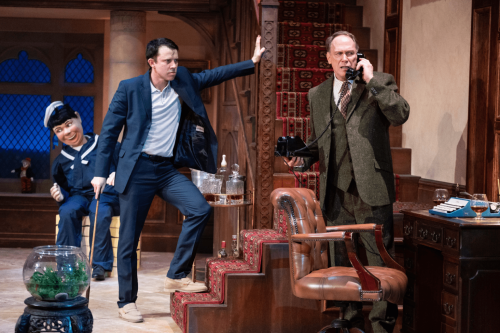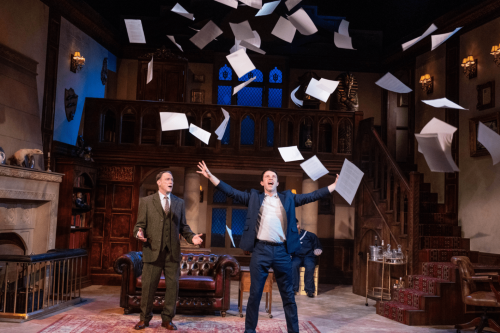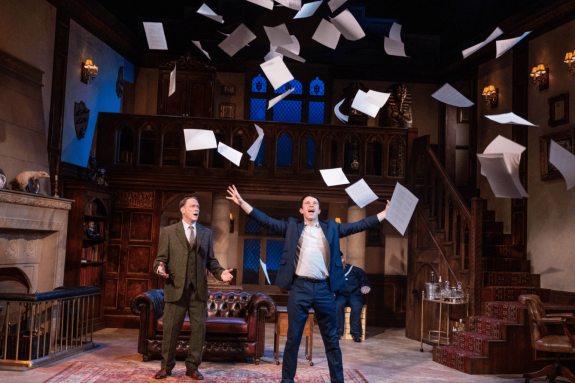 United Kingdom Anthony Shaffer’s Sleuth: Palace Theatre, Westcliff-on-Sea, Essex, 25.3.2024. (JPr)
United Kingdom Anthony Shaffer’s Sleuth: Palace Theatre, Westcliff-on-Sea, Essex, 25.3.2024. (JPr)

Creatives:
Written by Anthony Shaffer
Director – Rachel Kavanaugh
Designer – Julie Godfrey
Lighting designer – Tim Oliver
Sound designer – Andy Graham
Fight director – Bret Yount
Cast:
Todd Boyce – Andrew Wyke
Neil McDermott – Milo Tindle
I notice how the late Anthony Shaffer (1926-2001) gravestone has the inscription ‘Grand Artificer of Mysteries’, though it was another dedication I thought of most when watching his 1970 Tony Award-winning Sleuth, arguably the play he is most remembered for. Though its authenticity is disputed, a commemorative plaque appeared recently on a bench in Bristol’s Royal York Crescent which reads: ‘For My Love 06.09.69 – 25.12.23 Husband, Father, Adulterer Yes, Roger, I knew’. This gives an insight into the plot of Sleuth which if you don’t know it is the only way to enjoy how it all plays (!) out.
As a result, it is another in a succession of plays I have reviewed but have needed to avoid any spoilers, the last being Murder in the Dark (review here). (Last year I finally saw The Mousetrap – not as a critic but just an interested theatregoer- and my spoiler about that one is, don’t waste your money!) I also have a lengthening list of shows I am writing about which have been adapted for the stage from films which mostly I have never seen; however, Sleuth was made into a 1972 film with Laurence Olivier and Michael Caine which I did see. Thankfully, that was over 50 years ago, and I had forgotten enough about it not to immediately remember what happens in Sleuth after a dramatic end to the first half.
Shaffer wrote the screenplay for Sleuth himself and I see his other credits include Robin Hardy’s seminal The Wicker Man (1973) but also Alfred Hitchcock’s dreadful Frenzy (1972). Hitchcock remains a ludicrously overrated director whose films are often technically poor, relying mostly on just their editing and music. Sleuth ran for 2,359 performances in London’s West End from 1970 to 1975 and partly concurrently 1222 performances on Broadaway. So it must have something that doesn’t need me to highlight its best points or even analyse where it could be even better.
There is an unchanging set from Julie Godfrey (atmospherically lit by Tim Oliver) whose furnishings, costumes, typewriter and landline suggests we are in the decade when the play was written (the 1970s). It is the oak-lined Wiltshire country house owned by celebrated mystery writer, Andrew Wyke, with its mullion windows, minstrel’s gallery, knickknacks, prominent sarcophagus and cackling and ‘dancing’ Jolly Jack Tar automaton; the later acting almost as a Greek chorus on what happens in Sleuth. Wyke has invited Milo Tindle who is staying nearby to pay him a visit and Wyke confronts Tindle over his affair with his wife Marguerite. Actually, Tindle is surprised when Wyke says he is welcome to her, but even though Tindle is an ambitious travel agent Wyke suggests he will not have the money to keep Marquerite in the life of luxury she is accustomed to. Perhaps Tindle is rather too easily brow-beaten into agreeing to Wyke’s plan to stage a ‘foolproof’ burglary, make off with some expensive jewellery which Wyke will claim for on his insurance. What follows is some cat and mouse gamesmanship between the two men especially after it becomes all too clear that there is an ulterior motive to all Wyke’s mind games. Though it seemed unlikely in the first half, you will see whether Wyke has met his match in Tindle when Inspector Doppler arrives not long after you sit back down after the interval.
Finishing in less than two hours (including an interval) Sleuth does not outstay its welcome: rarely does director Rachel Kavanagh allow anyone to stand still onstage. The two leading characters are always up to something in trying to outwit each other as the stakes rise and it all builds to a gripping – if slightly rushed – climax. Along the way there is sufficient dark humour to loosen the grip Shaffer’s thriller will have on you.

The publicity for touring plays like Sleuth often relies too much on recognisable faces from TV and again we read how Neil McDermott was in EastEnders (even though he left in 2011) and Todd Boyce – with a more extensive biography – had a recurring role in Coronation Street over 27 years from 1996. They deserve to be better known for their evident talent and excellent acting than appearing in TV soaps.
Tom Boyce’s Andrew Wyke was an immense egoist who had spent too long in his own world devising the (near-)perfect crimes of his detective stories. He is somewhat prissy and fey with a clipped upper-class accent. Wyke gets the bulk of Shaffer’s dialogue and occasionally – however appropriate it is for the role – he speaks a little too quickly. Regardless, Boyce with his compelling performance brings a truly despicable character to life and – no real spoiler here – it is a pleasure to watch him slowly crumble in the second half. It is then when Neil McDermott as Milo Tindle gets his chance to shine after earlier being rather too compliant and in the shadow of Tom Boyce as the arrogant Wyke.
This fast-paced Sleuth gripped me with all the twists and turns of the plot mainly because, though I had seen the film version, I could not initially remember what would be happening. If you do not know Sleuth, I cannot recommend this highly enough and go see it while you can.
Jim Pritchard
For more about Sleuth on tour click here.
